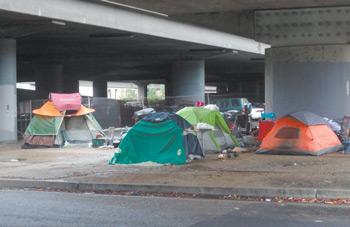 The 2018 Point-in-Time Annual Homeless Count estimates 372 people were homeless in Cumberland County during a 24-hour period Jan. 24-25. That’s 70 fewer than in the 2017 report. An estimated 31 percent were under the age of 18. The Point-in-Time count is a 24-hour snapshot of homelessness in the community. The information is used to assess local homeless assistance systems, to plan and structure programs to meet existing needs and to inform the public.
The 2018 Point-in-Time Annual Homeless Count estimates 372 people were homeless in Cumberland County during a 24-hour period Jan. 24-25. That’s 70 fewer than in the 2017 report. An estimated 31 percent were under the age of 18. The Point-in-Time count is a 24-hour snapshot of homelessness in the community. The information is used to assess local homeless assistance systems, to plan and structure programs to meet existing needs and to inform the public.
The count is mandated by the U.S. Department of Housing and Urban Development, which provides the city of Fayetteville and county of Cumberland millions of federal dollars annually. The goal of the Fayetteville-Cumberland County Continuum of Care on Homelessness is to significantly reduce homelessness in the community and “to develop and improve communitywide systems so homelessness is rare, brief and nonrecurring,” said chairwoman Laressa Witt.
Cumberland County is required to prepare and submit a one-year community development action plan that describes projects and activities expected to be implemented and funded with entitlement funds and competitive awards received from the U.S. Department of Housing and Urban Development. Cumberland County Community Development Interim Director Dee Taylor outlined the agency’s 2018 action plan:
• Increase the supply of affordable permanent housing/permanent supportive housing units for households with incomes 30 percent or more below the area median income.
• Increase emergency beds.
• Improve the communitywide centralized intake/coordinated process and/or one-stop day resource center.
• Increase the income (earned and benefits) for those who are in temporary housing.
• Increase services for homeless persons with mental illness and/or substance use disorders.
• Strengthen discharge planning coordination for those coming out of institutions (e.g. correctional, mental, etc.).
• Expand transportation options (work/appts).
The goals and outcomes identified in this action plan are taken from the five-year consolidated strategic plan, which describes how federal funds and other resources will be spent and what other actions must be taken to address the need for affordable housing and other homeless needs over the five-year period. The county will continue efforts to partner with local developers to increase the supply of affordable housing units by encouraging them to designate a percentage of units for extremely lowincome persons.
Community development continues to create expanding affordable housing opportunities for low and moderate-income citizens. However, because the county has a strong military presence, the transitional nature of the military population and the housing market ensures that affordable housing will remain a significant need for years to come. The aftermath of Hurricane Matthew in 2016 also contributes to a greater-than-usual housing shortage for the most vulnerable members of the community.
In partnership with other agencies, including the city of Fayetteville, nonprofit organizations, the real estate industry and concerned citizens, officials say they will continue to be creative in efforts to provide decent, safe, affordable housing for families and individuals. Many of these individuals and families will also need long-term comprehensive case management and continued mental health services to maintain self-sufficiency and avoid becoming homeless again.